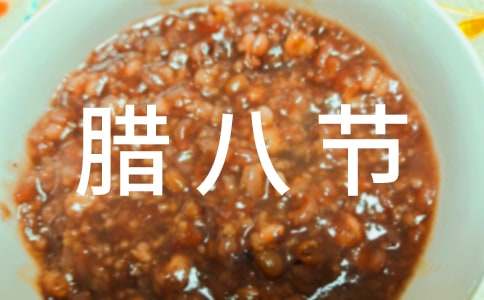- 相關(guān)推薦
臘八節(jié)的來歷英語作文
臘八節(jié),俗稱“臘八” ,即農(nóng)歷十二月初八,古人有祭祀祖先和神靈、祈求豐收吉祥的傳統(tǒng),下面是我為大家?guī)淼呐D八節(jié)的來歷英語作文,希望大家喜歡。

臘八節(jié)的來歷英語作文
Legend about the origin of this festivity abounds One maintains that over 3,000 years ago sacrificial rites were held in the twelfth lunar month when people offered up their prey to the gods of heaven and earth. The Chinese characters for the hunt and the twelfth month (lie and la) were interchangeable then, and ever since la has been used to refer to both. Since the festival was held on the eighth day of the last month, people later appended the number eighth (ba in Chinese), giving us the current laba.
Buddhism was well accepted in the areas inhabited Han Chinese, who believed that Sakyamuni, the first Buddha and founder of the religion, attained enlightenment on 12/8. Sutras were chanted in the temples and rice porridge with beans, nuts and dried fruit was prepared for the Buddha. With time the custom extended, especially in rural areas where peasants would pray for a plentiful harvest in this way.
其他關(guān)于臘八節(jié)的英語作文篇一
LaBa morning, get up early, and their brother and sister, and mother in the red laba rice porridge, run to the courtyard
scrambled to feed on every last night at the door of the people on both sides of the ice, with red beans to give him how small mouth, like laughing at the ice of man, the in the mind don't mention how beautiful.
其他關(guān)于臘八節(jié)的英語作文篇二
Buddhism was well accepted in the areas inhabited by the Han Chinese, who believed that Sakyamuni the first Buddha and founder of the religion, attained enlightenment on the eighth day of the twelfth month. Sutras were chanted in the temples and rice porridge with beans, nuts and dried fruit was prepared for the Buddha. With the passing of time the custom extended, especially in rural areas where peasants would pray for a plentiful harvest in this way.
There is, however, another touching story: When Sakyamuni was on his way into the high mountains in his quest for understanding and enlightenment, he grew tired and hungry. Exhausted from days of walking, he fainted away by a river in India. A shepherdess found him there and fed him her lunch -- porridge made with beans and rice. Sakyamuni was thus able to continue his journey.
其他關(guān)于臘八節(jié)的英語作文篇三
Northerners prefer to use glutinous rice, red beans, dates, lotus sees, dried longan pulp, walnuts, pine nuts and other dried fruits in their porridge; southerners like a salty porridge prepared with rice, soybeans, peanuts, broad beans, taro, water chestnuts, walnuts, vegetables and diced meat. Some people like to add cinnamon and other condiments to inject flavor. Controlling the heat is of great importance in the outcome. At the start, the flame must be high, but the fire is then turned down to let the porridge simmer until it begins to emit avery delicious smell. The process is time-consuming but not complicated.
Laba porridge is not only easy to prepare, but also a nutritious winter food because it contains amino acids, protein and other vitamins people need. Cooked nuts and dried fruit are good for smoothing nerves, nourishing one’s heart and vitality, and strengthening the spleen. Perhaps that is why it is also called babao (Eight Treasure) porridge.
其他關(guān)于臘八節(jié)的.英語作文篇四
Legend about the origin of this festivity abounds One maintains that over 3,000 years ago sacrificial rites were held in the twelfth lunar month when people offered up their prey to the gods of heaven and earth. The Chinese characters for the hunt and the twelfth month (lie and la) were interchangeable then, and ever since la has been used to refer to both. Since the festival was held on the eighth day of the last month, people later appended the number eighth (ba in Chinese), giving us the current laba.
Buddhism was well accepted in the areas inhabited Han Chinese, who believed that Sakyamuni, the first Buddha and founder of the religion, attained enlightenment on 12/8. Sutras were chanted in the temples and rice porridge with beans, nuts and dried fruit was prepared for the Buddha. With time the custom extended, especially in rural areas where peasants would pray for a plentiful harvest in this way.
【臘八節(jié)的來歷英語作文】相關(guān)文章:
臘八作文:臘八節(jié)的來歷10-09
臘八節(jié)的來歷作文10-09
臘八節(jié)的來歷09-24
有關(guān)臘八節(jié)的作文:臘八節(jié)的來歷10-09
【推薦】臘八節(jié)的來歷作文07-14
臘八為話題的作文:臘八節(jié)的來歷10-09
臘八的來歷作文07-29
臘八的來歷作文02-09
臘八節(jié)的來歷介紹01-11